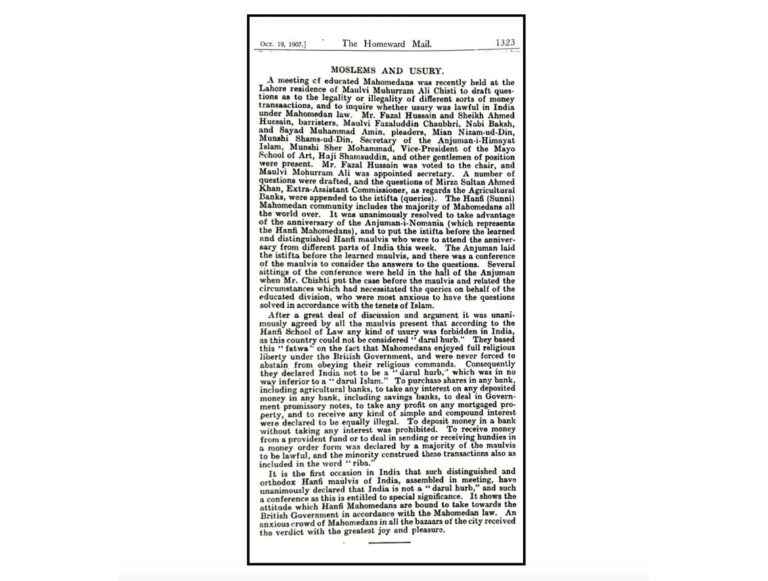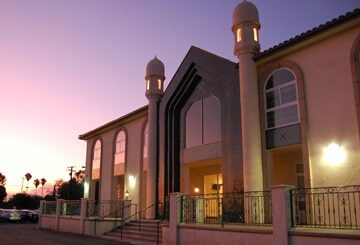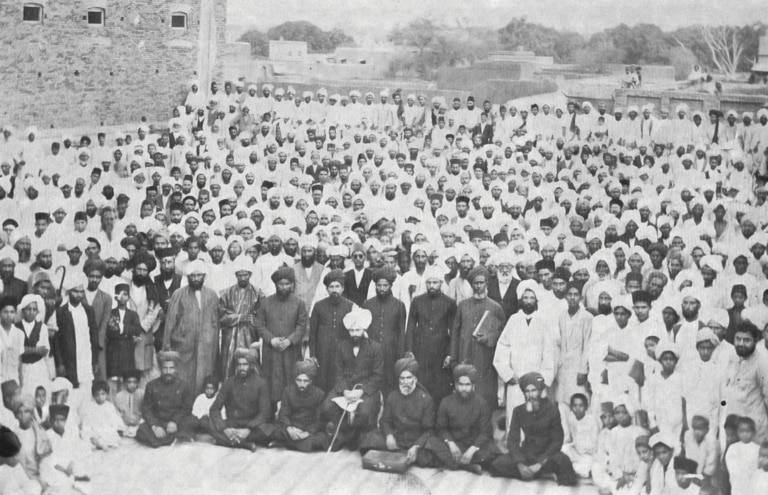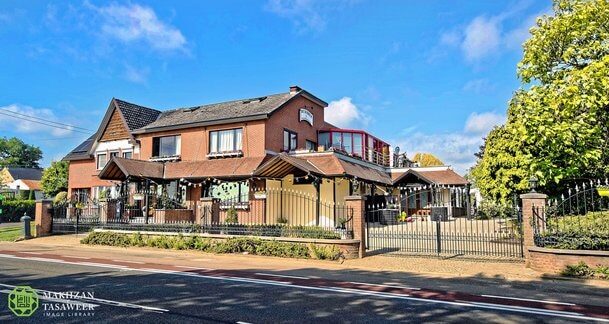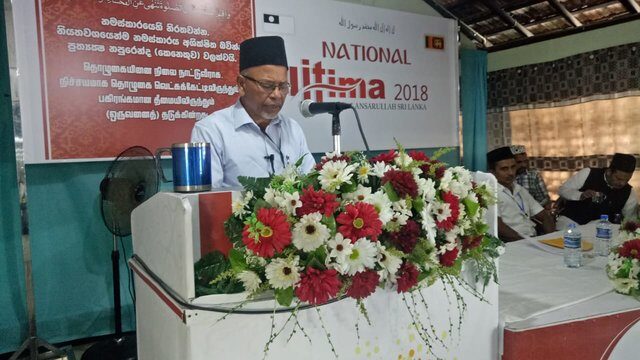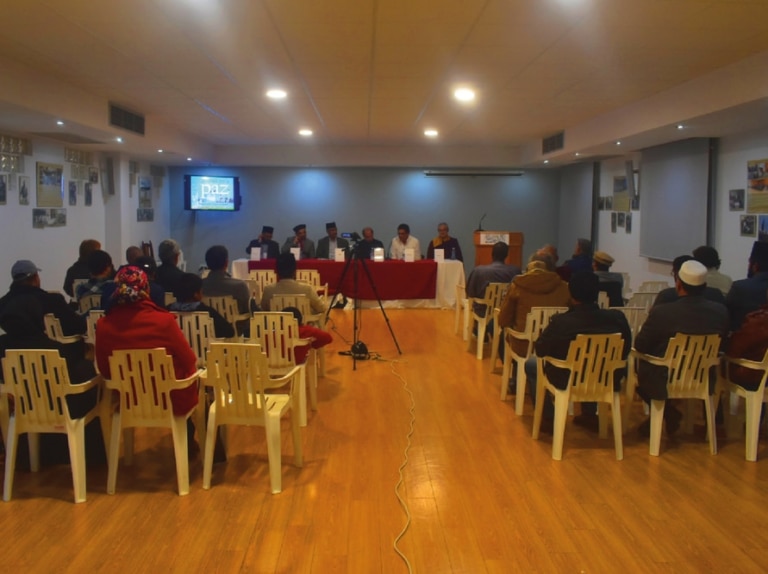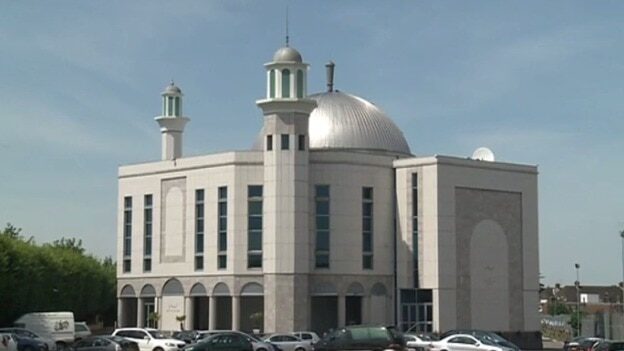Friday Sermon
23 November 2018
Men of Excellence
After reciting the Tashahud, Ta‘awuz, and Surah al-Fatihah, Hazrat Khalifatul Masih Vaa stated:
From today, I will resume relating the accounts of the Companionsra of the Holy Prophetsa, who participated in the Battle of Badr. The first companion who I shall mention is Hazrat Sinanra bin Abi Sinaan, who belonged to the tribe of Banu Asad and was a confederate of the Banu Abdi Shams. He participated in the Battle of Badr. He also accompanied the Holy Prophetsa in all of the battles, including Uhud, Khandaq and [the treaty of] Hudaibiya.
There are varying opinions as to who performed the first Bai‘at [oath of allegiance] during the Bai‘at-e-Rizwan. According to some it was Hazrat Abdullahra bin Umar who performed the Bai‘at, whilst others have mentioned the name of Hazrat Salmara bin Al-Akwa instead. However, according to Waqidi it was Hazrat Sinanra bin Abi Sinaan who was the first to perform the Bai‘at. Other people are of the opinion that it was the father of Hazrat Sinanra who had the honour of performing the first Bai‘at. In any case, it is recorded in history that at the occasion of the Bai‘at-e-Rizwan, the Holy Prophetsa started taking the Bai‘at, Hazrat Sinanra also extended his hand to perform the Bai‘at. Upon this, the Holy Prophetsa asked, “For what reason do you make your pledge?” Hazrat Sinanra replied, “Whatever is in your heart.” Upon this, the Holy Prophetsa said, “Are you aware of what is in my heart?” Being in the company of the Holy Prophetsa had a profound effect on the Companions and hence he replied, “[You have intended] to attain victory or martyrdom.” Hearing this, other people also started to say that they pledged their allegiance on the same terms as Hazrat Sinanra. (Raud Al-Anf, Vol. 4, p. 62, Dar-ul-Kutub Al-Ilmiyyah, Beirut) (Al-Sira Al-Halbiyyah, Vol. 3, p. 326, Bab Dhikr Maghaziyah, Dar-ul-Kutub Al-Ilmiyyah, Beirut, 2002) (Al-Tabaqaat-ul-Kubra Li-ibn Sa‘d, Vol. 3, p. 69, Sinan bin Abi Sinan wa min Hulafa Bani Abdi Shams, Dar-ul-Kutub Al-Ilmiyyah, Beirut, 1990) (Usdul Ghaba Fi Marifati Al-Sahaba, Vol. 3, p. 561, Sinan bin Abi Sinan, Dar-ul-Kutub Al-Ilmiyyah, Beirut, 2003)
Hazrat Sinanra was a prominent Muhajir companion, [the Muslims of Mecca who migrated to Medina]. (Sirat Ibn Katheer, p. 280, Asmaa Ahli Badr, Harf Al-Seen, Dar-ul-Kutub Al-Ilmiyyah, Beirut, 2005) (Tarikh Al-Islam Wa Wafiyyaat Al-Mashaheer Wa Al-A’laam, Vol. 3, p. 371, Dar-ul-Kutub Al-Arabi, Beirut, 1993, Maktabah Al-Shamilah)
When Tulaiha bin Khuwailid claimed prophethood, Hazrat Sinanra – who at the time was the governor of Banu Maalik – was the first person to inform the Holy Prophetsa through writing. (Tarikh Al-Tabari, Vol. 3, p. 245, Sanah Ihdaa Asharah, Dar Al-Fikr, Beirut, 2002)
The second companion, whose account will be given is Hazrat Mahjara, who was the slave of Hazrat Umarra. His father’s name was Salih. He was the first martyr of the Battle of Badr. He came from Yemen. Previously he had been brought to Hazrat Umarra as a prisoner. At that time, Hazrat Umarra freed him out of kindness. He was from among the early companions who had migrated to Medina. He participated in the Battle of Badr, and as mentioned before, he had the honour of being the first martyr of the Muslim army. He was standing among the ranks when a stray arrow hit him and as a result of this he was killed. It was the arrow of Aamir bin Hazrami, which martyred him. It is narrated by Hazrat Saeed bin Musayyib that when Hazrat Mahja was martyred, he was reciting the following words:
اَنَا مَهجع وَاِليَ رَبِّي اَرْجِعُ
“I am Mahja, and to my Lord, I am returning.”
Hazrat Mahjara was among the people, regarding whom the following verse was revealed:
وَلَا تَطۡرُدِ لَّذِينَ يَدۡعُونَ رَبَّهُم بِلۡغَدٰوةِ وَلۡعَشِىِّ يُرِيدُونَ وَجۡهَهُ
“And drive not away those who call upon their Lord morning and evening, seeking His countenance.” (Surah al-An‘am, Ch.6: V.53)
Apart from him, the following companions were also included in this; Hazrat Bilalra, Hazrat Sohaibra, Hazrat Ammarra, Hazrat Khabbabra, Hazrat Utbahra bin Ghazwan, Hazrat Ausra bin Khauli and Hazrat Aamirra bin Fuhaira. (Al-Tabaqaat-ul-Kubra Li-ibn Sa‘d, Vol. 3, pp. 299-300, Mahja bin Salih, Dar-ul-Kutub Al-Ilmiyyah, Beirut, 1990) (Usdul Ghaba Fi Marifati Al-Sahaba, Vol. 5, p. 268, Mahja, Dar-ul-Kutub Al-Ilmiyyah, Beirut, 2003) (Kanz Al-Ummal, Vol. 10, p.408, Kitab Al-Ghazwat, Hadith 29985, Mu’assisah Al-Risalah, Beirut, 1985)
The meaning of this verse does not infer that the Holy Prophetsa would, God forbid, turn away the poor. His love, honour, respect and kindness for the poor was unparalleled and extraordinary, which one can gauge from the Ahadith, as well as from the personal testimonies of these very people.
This verse actually serves as a response to those affluent and highly ranked people, who desired to receive more honour and respect. In response to this, God Almighty stated that He had already commanded the Prophetsa to respect and honour those impoverished people, who had greatly excelled in the remembrance of Allah and His worship, which is more valuable in the sight of God Almighty than their personal wealth and familial honour. In fact, a prophet of Allah does as he is commanded by God.
Hence, this verse serves as a response to those affluent individuals, who believed that their status was superior, and therefore God stated that the Prophet of Allah did not care for their honour and affluence. However, the poor and impoverished people were dear to him.
Another companion was Hazrat Aamirra bin Mukhallad. The name of his mother was Umaarah bint Khansaa. He belonged to Banu Malik bin Najjaar of the Khazraj tribe. He took part in the Battles of Badr and Uhud and he was martyred during the latter. (Al-Tabaqaat-ul-Kubra Li-ibn Sa‘d, Vol. 3, pp. 375-376, Aamir bin Mukhallad, Dar-ul-Kutub Al-Ilmiyyah, Beirut, 1990)
Another companion was Hazrat Haatibra bin Amr bin Abdi Shams. His title was Abu Hatib and belonged to the tribe of Banu Aamir bin Luayy. His mother was Asma bint Harith bin Naufal, who belonged to the tribe of Ashja. Hazrat Sohail bin Amr, Hazrat Saleed bin Amr and Hazrat Sakraan bin Amr were his brothers. One of his children was Amr bin Haatib and his mother’s name was Raitah bint Alqamah. (Usdul Ghaba Fi Marifati Al-Sahaba, Vol. 1, p. 662, Hatib bin Amr, Dar-ul-Kutub Al-Ilmiyyah, Beirut, 2003) (Al-Tabaqaat-ul-Kubra Li-ibn Sa‘d, Vol. 3, p. 309, Hatib bin Amr, Dar-ul-Kutub Al-Ilmiyyah, Beirut, 1990)
Before the Holy Prophetsa went to Darul Arqam [House of Arqam – first designated place where Muslims could meet and worship in secrecy], he had accepted Islam through the preaching of Hazrat Abu Bakr Siddiquera. He migrated to Abyssinia on two occasions. According to one narration, the first person to reach Abyssinia during the first migration was Hazrat Haatib bin Amr bin Abdi Shams.
When he migrated from Mecca to Medina, he stayed at the house of Hazrat Rufaa bin Abdil Munzir, who was the brother of Hazrat Abu Lubaba bin Abdil Munzir. He took part in the Battle of Badr along with his brother, Hazrat Saleed bin Amr and also took part in the Battle of Uhud. (Al-Tabaqaat-ul-Kubra Li-ibn Sa‘d, Vol. 3, p. 309, Hatib bin Amr, Dar-ul-Kutub Al-Ilmiyyah, Beirut, 1990) (Sirat Ibn Hisham, pp. 117-119, Bab Islam Abi Bakr Wa Man Ma’ahu Min Al-Saabiqeen, Dar Ibn Hazam, Beirut, 2009)
Hazrat Saleed bin Amr arranged the marriage between the Holy Prophetsa and Hazrat Saudahra bint Zamaa. According to some, Hazrat Abu Haatib bin Amr arranged this marriage. The dowry on that occasion was set at four hundred dirhams. The details of this marriage have been recorded in Al-Tabaqatul Kubra where it mentions that the first husband of Hazrat Saudara, Hazrat Sakran bin Amr – who was the brother of Hazrat Haatib bin Amr – passed away in Mecca after having returned from Abyssinia. When the iddat [prescribed waiting period] of Hazrat Saudara came to an end, the Holy Prophetsa sent a proposal of marriage to her. Hazrat Saudara said; “I leave this matter in your hands.” Upon this, the Holy Prophetsa said that she should appoint a man from her tribe so that he may give her into marriage to him. Subsequently, Hazrat Saudara appointed Hazrat Haatib bin Amr for this task. Thus, Hazrat Haatib gave Hazrat Saudara into marriage to the Holy Prophetsa. Following Hazrat Khadijara, Hazrat Saudara was the first woman to be married to the Holy Prophetsa. (Sirat Ibn Hisham, pp. 117-119, Dhikr Azwaajihi Saudah bint Zamaa, Dar Ibn Hazam, Beirut, 2009) (Al-Tabaqaat-ul-Kubra Li-ibn Sa‘d, Vol. 8, p. 42, Dhikr Azwaaji Rasul Allah, Dar-ul-Kutub Al-Ilmiyyah, Beirut, 1990)
Hazrat Haatib also took part in the Bai‘at-e-Rizwan at Hudaybiyyah. (Kitab-ul-Maghaazi, Vol. 2, p. 92, Bab Ghazwah Hudaibiyyah, Dar-ul-Kutub Al-Ilmiyyah, Beirut, 2004)
Then there is a companion by the name of Hazrat Abu Khuzaima bin Aus. The name of his mother was Amrah bint Masud. He is the brother of Hazrat Masud bin Aus. Hazrat Masood bin Aus also took part in the Battle of Badr. Hazrat Abu Khuzaima participated alongside the Holy Prophetsa in all battles, including the Battles of Badr, Uhud and Khandaq [trench]. He passed away during the Khilafat of Hazrat Usmanra. (Al-Tabaqaat-ul-Kubra Li-ibn Sa‘d, Vol. 3, p. 373, Abu Khuzaima bin Aus, Dar-ul-Kutub Al-Ilmiyyah, Beirut, 1990)
There is a companion by the name of Hazrat Tamim Maula Khiraash. Hazrat Tamim was the freed slave of Hazrat Khiraash. The Holy Prophetsa established a bond of brotherhood between him and Hazrat Khabbab, who was the freed slave of Utbah bin Ghazwaan. He participated in the Battles of Badr and Uhud. (Al-Tabaqaat-ul-Kubra Li-ibn Sa‘d, Vol. 3, p. 429, Tamim Maula Khiraash, Dar-ul-Kutub Al-Ilmiyyah, Beirut, 1990)
Another companion was Hazrat Munzir bin Qudamah. Hazrat Munzir bin Qudamah belonged to the tribe of Banu Ghanam. He participated in the battles of Badr and Uhud. According to Allama Waqidi, he was appointed to oversee the captives of Banu Qainuqa. (Al-Isaba fi Tamyiz Al- Sahaba, Vol. 6, p. 172, Munzir bin Qudamah, Dar-ul-Kutub Al-Ilmiyyah, Beirut, 1995) (Al-Tabaqaat-ul-Kubra Li-ibn Sa‘d, Vol. 3, p. 367, Tamim Maula Khiraash, Dar-ul-Kutub Al-Ilmiyyah, Beirut, 1990)
Then, there is a companion by the name of Hazrat Harith bin Haatib. His title was Abu Abdullah. His mother’s name was Umama bint Saamit. He belonged to the Ansar tribe of Aus. He was the brother of Hazrat Tha‘labah bin Haatib. Hazrat Harith bin Haatib and Hazrat Abu Lubaba bin Abdil Munzir were accompanying the Holy Prophetsa on the way to the Battle of Badr when at Rauha, the Holy Prophetsa appointed Hazrat Abu Lubaba bin Abdil Munzir as the governor of Medina and Hazrat Harith bin Haatib as the leader of the tribe of Banu Amr bin Auf and sent them back to Medina. However, they were both included among those who participated in the Battle of Badr and were also given a share of the spoils of war. Including the battles of Badr, Uhud and Khandaq, he was also blessed to participate alongside the Holy Prophetsa in the Bai’at-e-Rizwan. Since he intended to participate in the battle and having made preparations he set out with everyone else, the Holy Prophetsa counted him among those who took part in the Battle of Badr, despite the fact that he had sent him back as the governor. During the Battle of Khaybar, a Jew shot an arrow at him from the top of the fort, which struck the head of Hazrat Harith bin Haatib and resulted in his martyrdom. (Usdul Ghaba Fi Marifati Al-Sahaba, Vol. 1, p. 598, Harith bin Haatib, Dar-ul-Kutub Al-Ilmiyyah, Beirut, 2003) (Al-Tabaqaat-ul-Kubra Li-ibn Sa‘d, Vol. 3, p. 351, Harith bin Haatib, Dar-ul-Kutub Al-Ilmiyyah, Beirut, 1990)
Another companion is Hazrat Tha‘labah bin Zaid. He belonged to the Ansar tribe of Banu Khazraj. He participated in the Battle of Badr. He was the father of Hazrat Thabit bin Al-Jiz. Hazrat Tha‘labah bin Zaid’s title was Al Jiz. He is called Al Jiz due to his strong heart, determination and resolve. A tree with a strong trunk is called Jiz, as well as the beam of a roof. Nevertheless, he possessed a strong heart, determination and resolve and as a result of this, he was given the title of Al Jiz. No narration of Hazrat Tha‘labah bin Zaid has been preserved. (Usdul Ghaba Fi Marifati Al-Sahaba, Vol. 1, p. 467, Tha’labah bin Zaid, Dar-ul-Kutub Al-Ilmiyyah, Beirut, 2003) (Al-Tabaqaat-ul-Kubra Li-ibn Sa‘d, Vol. 3, p. 428, Thabit bin Tha’labah, Dar-ul-Kutub Al-Ilmiyyah, Beirut, 1990) (Arabic-English Lexicon by William Lane, Part 2, p. 396, Librarie du Liban, 1968)
Another companion is Hazrat Uqbah bin Wahab. He was also known as Ibn Abi Wahab. He was the confederate of the tribe of Banu Abdi Shams bin Abdi Manaf. Including the battles of Badr, Uhud and Khandaq, he participated in all battles alongside the Holy Prophetsa. (Usdul Ghaba Fi Marifati Al-Sahaba, Vol. 4, p. 59, Uqbah bin Wahab, Dar-ul-Kutub Al-Ilmiyyah, Beirut, 2003) (Al-Tabaqaat-ul-Kubra Li-ibn Sa‘d, Vol. 3, p. 70, Uqbah bin Wahab, Dar-ul-Kutub Al-Ilmiyyah, Beirut, 1990)
When a Jewish delegation came to Medina in order to meet the Holy Prophetsa, the Holy Prophetsa preached to them, but they openly rejected his message. Hazrat Uqbah bin Wahab was among the companions who rebuked them for openly rejecting the message. This incident has been recorded in the following manner:
“On one occasion, Numan bin Ada, Bahri bin Amr and Shaais bin Adi came to the Holy Prophetsa. The Holy Prophetsa spoke to them and called them towards the way of Allah. He invited them to Islam and admonished them about God’s punishment. They replied in the same manner as the Christians saying: ‘O Muhammadsa, why do you try to incite fear in us? We are the sons of God and are His beloved’. The following verse was revealed by Allah the Almighty in relation to them:
وَقَالَتِ لۡيَهُودُ وَلنَّصَـٰرَىٰ نَحۡنُ أَبۡنَـٰٓؤُ اللّٰهِ وَأَحِبَّـٰٓؤُهُ ۚ قُلۡ فَلِمَ يُعَذِّبُكُمْ بِذُنُوبِكُم ۖ بَلۡ أَنتُم بَشَرٌ۬ مِّمَّنۡ خَلَقَ ۚ يَغۡفِرُ لِمَن يَشَآءُ وَيُعَذِّبُ مَنْ يَشَآءُۚ وَ لِلّٰهِ مُلۡكُ لسَّمَـٰوَتِ وَلۡأَرۡضِ وَمَا بَيۡنَهُمَا ۖ وَإِلَيۡهِ لۡمَصِيرُ
‘The Jews and the Christians say, “We are sons of Allah and His loved ones.” Say, “Why then does He punish you for your sins? Nay, you are only human beings among those He has created.” He forgives whom He pleases and punishes whom He pleases. And to Allah belongs the kingdom of the heavens and the earth and what is between them, and to Him shall be the return.’” (Surah al-Maidah: Ch.5: V.19)
According to Ibn Ishaaq, after the Holy Prophetsa invited the group towards Islam and warned them about associating partners with Allah, they not only rejected the Holy Prophetsa but also his teachings. Upon this, Hazrat Muaz bin Jabl, Hazrat Saad bin Abadah and Hazrat Uqbah bin Wahab said to them: “O ye Jews! Fear Allah! We swear by Allah, you know that he is most certainly the Messenger of Allah. We witnessed how even before his claim to prophethood, you would praise his qualities and character.” In reply Raafay bin Huraimilah and Wahab bin Yahuza said: “Neither did we ever praise him before and nor has God revealed any scripture after Mosesas and nor will He do so in the future. God has not sent any warner or bearer of glad tidings after Mosesas and nor will He send anyone.” (Sirat Ibn Hisham, pp. 265-266, Bab Ma Nazala Fi Al-Munafiqeen Wa Yahud, Dar Ibn Hazam, Beirut, 2009)
In other words, they completely denied everything even though these prophecies are found in the Torah. This is the same case of some of the Muslim scholars of today who reject the Promised Messiahas. First, they would lament for the Messiah to descend and now they say that no Messiah will appear.
Another companion is Hazrat Habibra bin Aswad. Hazrat Habibra bin Aswad bin Saad was a freed slave from the Ansar tribe Banu Haraam. He took part in the battles of Badr and Uhud. He left behind no children. We also find mention of him by the name of Khubaib. (Al-Tabaqaat-ul-Kubra Li-ibn Sa‘d, Vol. 3, p. 429, Habib bin Al-Aswad, Dar-ul-Kutub Al-Ilmiyyah, Beirut, 1990) (Al-Isaba fi Tamyiz Al- Sahaba, Vol. 2, p. 18, Habib bin Sa’d, Dar-ul-Kutub Al-Ilmiyyah, Beirut, 1995) (Usdul Ghaba Fi Marifati Al-Sahaba, Vol. 1, p. 671, Habib bin Al-Aswad, Dar-ul-Kutub Al-Ilmiyyah, Beirut, 2003)
Another companion is Hazrat Usaimahra Ansari. He belonged to the Banu Ashja tribe. He was a confederate of Banu Ghanam bin Maalik bin Najjaar. He participated in the Battles of Badr, Uhud, Khandaq [trench] and all other battles with the Holy Prophetsa. He passed away in the era of Hazrat Muawiya bin Abi Sufiyan. (Al-Tabaqaat-ul-Kubra Li-ibn Sa‘d, Vol. 3, p. 377, Usaimah, Dar-ul-Kutub Al-Ilmiyyah, Beirut, 1990)
Another companion is by the name of Hazrat Raafay bin Harith. His full name was Raafay bin Harith bin Sawad. He belonged to the Ansar tribe of Banu Najjaar. He took part in all the battles alongside the Holy Prophetsa, including the Battle of Badr, Uhud and Khandaq. He passed away during the Khilafat of Hazrat Usmanra. Hazrat Raafay bin Harith had a son whose name was Harith. (Al-Tabaqaat-ul-Kubra Li-ibn Sa‘d, Vol. 3, p. 373, Raafay bin Al-Harith, Dar-ul-Kutub Al-Ilmiyyah, Beirut, 1990)
Hazrat Rukhailara bin Thalaba was a companion who took part in the Battle of Badr. His name has been recorded differently in various narrations. Some mention his name as Rukhaila and others Rujaila or Ruhaila etc. His father’s name was Tha‘labah bin Khalid. He took part in the Battles of Badr and Uhud. He was from a branch of the Banu Khazraj tribe called Banu Bayaza. He accompanied Hazrat Alira during the Battle of Siffin. (Usdul Ghaba Fi Marifati Al-Sahaba, Vol. 2, p. 273, Rukhaila bin Tha’labah, Vol. 1 p. 509, Jablah bin Tha’labah, Dar-ul-Kutub Al-Ilmiyyah, Beirut, 2003) (Al-Tabaqaat-ul-Kubra Li-ibn Sa‘d, Vol. 3, p. 450, Rukhaila bin Tha’labah, Dar-ul-Kutub Al-Ilmiyyah, Beirut, 1990)
Hazrat Jabirra bin Abdullah bin Riaab was another companion. Hazrat Jabirra is counted amongst the first six men of the Ansar who accepted Islam [during their visit] in Mecca. Hazrat Jabir took part in all battles alongside the Holy Prophetsa including the Battles of Badr, Uhud and Khandaq. He has also related sayings of the Holy Prophetsa known as Hadith. (Al-Tabaqaat-ul-Kubra Li-ibn Sa‘d, Vol. 3, p. 431, Jaabir bin Abdullah, Dar-ul-Kutub Al-Ilmiyyah, Beirut, 1990)
At the First Pledge of Aqabah, he was the first among the Ansar to accept Islam. Some of the Ansar met the Holy Prophetsa during the night on the occasion of the First Pledge at Aqaba. The Holy Prophetsa asked them which tribe they belonged to, upon which they introduced themselves in great detail. The six people from the Banu Najjar tribe were as follows: Asad bin Zarara, Auf bin Harith bin Rufaah bin Afraa, Raafay bin Maalik bin Ajlaan, Qutbah bin Aamir bin Hadidah, Uqbah bin Aamir bin Naabi bin Zaid and Jaabir bin Abdullah bin Riyaab. When all of them returned to Medina, they preached the message to the people of Medina. (Usdul Ghaba Fi Marifati Al-Sahaba, Vol. 1, p. 492, Jaabir bin Abdillah bin Riaab, Dar-ul-Kutub Al-Ilmiyyah, Beirut, 2003)
Hazrat Thabit bin Aqram bin Tha‘laba was another Badri companion. His name was Hazrat Thabit bin Aqram bin Tha‘laba bin Addi bin Ajlaan. He was confederate of the Ansari tribe Banu Amr bin Auf. In addition to the Battle of Badr, he took part in all other battles with the Holy Prophetsa. (Al-Isti’aab Fi Ma’rifati Al-Sahaba, Vol. 1, p. 199, Thabit bin Aqram, Da-ul-Jeel, Beirut, 1992)
When the Holy Prophetsa arrived in Medina, he told Asim bin Addi to make his home in the mosque. However, Asim replied, “O Messenger of Allahsa, I shall not make this mosque into my home as Allah the Almighty has revealed what he intended to reveal, however you may give it to Thabit bin Aqram as he has no home”. The Holy Prophetsa therefore allocated this space to Hazrat Thabit bin Aqram. He did not have any children. (Subul-ul-Hudaa Wa Al-Rashaad, Vol. 5, p. 677, Bab Dhikr Amr Masjid Al-Diraar, Cairo, 1992)
The place that was allocated was perhaps in the vicinity of the mosque, or a place adjacent to the mosque where prayers had once been offered. Nevertheless, I feel this passage has not been translated properly. Some accounts have context to them and so the Research Cell who send these notes should research for themselves before sending them. They should not simply translate the notes like school children and send them over.
During the Battle of Mauta, after the martyrdom of Abdullahra bin Rawaha, the flag of Islam was taken by Hazrat Thabitra bin Aqram. He said, “O Muslims! Appoint someone from among you as your leader.” The Muslims responded, “We appoint you as our leader”. He said that he could not become the leader. Subsequently the people appointed Hazrat Khalidra bin Walid as their leader. This is mentioned in Siratun Nabi [Life and Biography of the Holy Prophet] by Ibn Hisham. (Sirat Ibn Hisham, p. 533, Bab Dhikr Ghazwah Mautah, Dar Ibn Hazam, Beirut, 2009)
In the accounts of history, it is said that during the Battle of Mauta, when the Muslims first saw the numbers and strength of the opposing army, they thought that it would be impossible to compete with such an army. It is narrated by Hazrat Abu Hurairahra that he had taken part in the Battle of Mautah. He relates that when they saw the enemy approaching, they saw their large numbers, weaponry, horses, gold and silk, they felt it was not possible for them to mount a challenge – this sight left him bewildered. Upon this Hazrat Thabitra bin Aqram said to him, “O Abu Huraira! You are overcome as if you have seen an enormous army.” Hazrat Abu Hurairara replied: “Yes indeed I have.” Hazrat Thabitra then said, “Were you not present with us in the Battle of Badr? Even there we were not victorious due to greater numbers. Did we not see victory despite the bigger numbers of the enemy?” (Subul-ul-Hudaa Wa Al-Rashaad, Vol. 6, p. 148, Bab Fi Siryah Mautah, Dar-ul-Kutub Al-Ilmiyyah, Beirut, 1993)
“Indeed, we gained victory then through the Grace of Allah, and here too we will witness the same.”
During the Khilafat of Hazrat Abu Bakrra, Hazrat Thabitra went with Hazrat Khalidra bin Walid to face the rebels. When facing the enemy, Hazrat Khalidra bin Walid would not attack if he heard the words of the Azan [the call to prayer in Islam] and if he did not hear the words of the Azan, then he would proceed with the attack. When he arrived at a place named Buzakha, he sent forth Hazrat Okashara bin Mehsan and Hazrat Thabitra bin Aqram as informants to obtain intelligence about the enemy. Both of them were on horseback. The name of Hazrat Okasha’s horse was Al Zaraam and the name of Hazrat Thabit’s horse was Al Mehbar. They both confronted Tulayha and his brother Salama, who had also proceeded to gather information about the opposing army. Tulayha faced off against Hazrat Okashara, and Salama was faced with Hazrat Thabit. These two brothers martyred both of these companions. There is another narration from Abu Waqid Laysi: “We were about two hundred horsemen riding in front of the army and Hazrat Zaid bin Khitab was our commander in chief. Thabit and Okasha were riding in front of us. It was unbearable to see them when we walked passed them (as the army caught up to them after their martyrdom). Hazrat Khalidra and the rest of the Muslim army were behind us. We stood by the martyred until Hazrat Khalidra arrived. We buried them in their same blood-stained clothes at the very location of their martyrdom as per the instructions of Hazrat Khalidra.” (Al-Tabaqaat-ul-Kubra Li-ibn Sa‘d, Vol. 3, pp. 355-356, Thabit bin Aqram, Dar-ul-Kutub Al-Ilmiyyah, Beirut, 1990)
It is narrated that when Tulayha converted to Islam, Hazrat Amirul Momineen – Hazrat Umarra said to him: “I cannot love you because you are the reason for the martyrdom of Hazrat Okasha and Hazrat Thabit bin Aqram.” Those who had martyred them later became Muslims themselves. Hazrat Umarra said to them that he would not love them, because they had martyred two Muslims. Tulayha responded: “O Leader of the believers: Allah Almighty honored them through my hands.” (Sunan Al-Kubra Lil-Buhaiqiyy, Vol. 8, pp. 580-581, Kitab-ul-Ashribah, Bab Qitaal Ahl Al-Ridah, Hadith 17631, Dar-ul-Kutub Al-Ilmiyyah, Beirut, 2003)
He did not have any children. Muhammad bin Umar states: “Tulayha martyred Hazrat Thabit in 12 Hijri at the location of Buzakha.” (Al-Tabaqaat-ul-Kubra Li-ibn Sa‘d, Vol. 3, pp. 355-356, Thabit bin Aqram, Dar-ul-Kutub Al-Ilmiyyah, Beirut, 1990)
Another Badri companion was Hazrat Salmara bin Salaama. He was amongst the Ansar and belonged to Banu Ashhal from the Banu Aus tribe. He was amongst the first to believe in the Holy Prophetsa when the news of his advent reached Medina. (Sirat Al-Sahaba, Vol. 3, p. 391, Salma bin Salaama, Dar-ul-Isha’at, Karachi, 2004)
He participated in the first and second Bai‘ats that took place at Aqabah. He had the honour of participating in all the battles alongside the Holy Prophetsa, including the Battle of Badr. Hazrat Umarra appointed him as the ruler of Yamama during his Khilafat. (Usdul Ghaba Fi Marifati Al-Sahaba, Vol. 2, p. 523, Salma bin Salaama, Dar-ul-Kutub Al-Ilmiyyah, Beirut, 2003)
Umar bin Qatadah states: “The Holy Prophetsa established a bond of brotherhood between Hazrat Salma bin Salaama and Hazrat Abu Sabra bin Abi Ruham”. However, according to Ibn-e-Ishaaq, this brotherhood was established between Hazrat Salma bin Salsama and Hazrat Zubair bin Al-Awaam.” (Al-Tabaqaat-ul-Kubra Li-ibn Sa‘d, Vol. 3, p. 335, Salma bin Salaama, Dar-ul-Kutub Al-Ilmiyyah, Beirut, 1990)
He narrates an incident from his childhood:
“Once, when I was young and was sitting amongst a few of my family members, a Jewish scholar came there and started speaking about the Day of Judgment and Reckoning, the weighing of good and evil deeds and heaven and hell. He stated, ‘The polytheist and idol worshippers shall be thrown into Hell.’” Since his family members were idol worshippers, they did not understand the concept of the dead being raised once again. “They asked this Jewish scholar: ‘Will the dead actually be raised again and held accountable for their actions in the hereafter?’ They had no concept of the afterlife. He responded: ‘Yes.’ They enquired: ‘Is there a sign for this?’ In response, he pointed towards Mecca and Yemen and stated: ‘A prophet will appear from here.’ They asked him: ‘When will this prophet appear?’ He pointed towards me as I was a young child at the time. He pointed towards me and said: ‘If this boy lives on, then he shall surely see that prophet.’” Hazrat Salmara says: “Only a few years had passed since this incident that we heard about the advent of the Holy Prophetsa and we all accepted him. All of us who were previously idol and fire worshipers accepted him.” That same Jewish scholar was also alive at the time but he did not accept the Holy Prophetsa due to jealousy. “We said to him: ‘You were the one to inform us about the Holy Prophetsa advent and now you are the one who is not accepting him.’ He responded by saying: ‘This is not the prophet I used to mention about.’” He further says that ultimately this person passed away in a state of disbelief.
During the Khilafat of Hazrat Usmanra when the discord and mischief increased significantly, Hazrat Salma bin Salaama went into seclusion and devoted himself to the worship of God. (Rahmat Daarain Ke Sau Shedai, pp.574-576, Taalib Hashmi, Al Badr Publications, Lahore, 2003) That is to say, he isolated himself for the worship of God due to the increased conflicts and discord. There is a disagreement about the year of his demise. Some say he passed away in 34 Hijri and others say he passed away in 45 Hijri. At the time of his demise, his was 74 years of age and he passed away in Medina. (Al-Isaba fi Tamyiz Al- Sahaba, Vol. 3, p. 125, Salma bin Salaama bin Waqsh, Dar-ul-Kutub Al-Ilmiyyah, Beirut, 2005)
Then there is Hazrat Jabrra bin Ateek who was a companion who participated in the Battle of Badr. He participated in the Battle of Badr and in all the other battles with the Holy Prophetsa. He lived in Medina and remained there until the demise of the Holy Prophetsa. Hazrat Jabrra bin Ateek’s title was Abdullah. He had two sons – Ateek and Abdullah and one daughter named Umm Thabit. The Holy Prophetsa established a bond of brotherhood between Hazrat Jabr bin Atiq and Hazrat Khabbab bin Al Arat. At the conquest of Mecca he was the flagbearer for Banu Mu‘awiyah bin Malik. Hazrat Jabrra bin Ateek passed away in 61 AH during the Khilafat of Yazid bin Mu‘awiyah at the age of 71. Rather it should be termed as an “era”, because it was not a Khilafat. (Al-Tabakaat-ul-Qubra Li-ibn Sa‘d, Vol. 3, p.357, Jabr bin Ateek, Dar-ul-Kutub Al-Ilmiyyah, Beirut, 1990)
Hazrat Thabitra bin Tha‘labah is the name of another Companion. He was also called Thabit bin Jaza. He was among the 70 Ansar Companions who were present at the second Bai‘at of Aqbah. He accompanied the Holy Prophetsa during the Battles of Badr, Uhud, Khandaq, [treaty of] Hudaibiyyah, Khaybar, the conquest of Mecca and during the Battle of Taif. He was martyred during the Battle of Taif. Hazrat Thabitra took part in the Battle of Badr along with his father Hazrat Tha‘labah. (Al-Tabakaat-ul-Qubra Li-ibn Sa‘d, Vol. 3, pp. 428-429, Thabit bin Tha’lbah, Dar-ul-Kutub Al-Ilmiyyah, Beirut, 1990) (Usdul Ghaba Fi Marifati Al-Sahaba, vol. 1, p.324, Tha’lbah bin Hartih, Dar-ul-Fikr wa An Nashr wa At Tauzi’, Beirut, 2003)
Another Companion is Hazrat Suhail bin Wahb. His name was Hazrat Suhailra bin Wahb bin Rabi‘ah bin Amr bin Aamir Quraishi. His mother was Da’ad, but she was better known as Baidaa. For this reason, he was also known as Ibn Baidaa. Hence, according to some accounts his name has been recorded as Suhail bin Baidaa. He belonged to the Banu Fehr branch of the Quraish tribe. (Al-Isaba fi Tamyiz Al- Sahaba, Vol. 3, p. 162, Suhail bin Baidaa Al Qarshi, Dar-ul-Kutub Al-Ilmiyyah, Beirut, 2005)
He accepted Islam in its early years. After accepting Islam, he migrated to Abyssinia and remained there for a long time. When Islam began being preached openly, he returned to Mecca and then went to Medina after the Holy Prophetsa. (Seeratus Sahabah, vol.2 p.577, Suhail bin Baidaa, Darul Ishaat, Karachi)
Hazrat Suahil participated in the Battle of Badr alongside his brother Hazrat Safwan bin Baidaa. (Al-Tabakaat-ul-Qubra Li-ibn Sa‘d, Vol.3, p. 318, Safwan bin Baidaa, Dar-ul-Kutub Al-Ilmiyyah, Beirut, 1990)
When he participated in the Battle of Badr he was 34 years of age. He accompanied the Holy Prophetsa in all battles including the Battle of Uhud and Khandaq. His other brother, Sahl participated in the Battle of Badr on the side of the idolaters. Allamah ibn Hajr Asqalani writes that Sahl accepted Islam in Mecca but did not disclose it to anyone, so the Quraish took him along to Badr and was then imprisoned.
Hazrat ibn Masud wrote a testimony about him saying that he had observed Sahl praying in Mecca, and therefore he was released. He later passed away in Medina and the Holy Prophetsa led the funeral prayers of Sahl and Hazrat Suhail in the mosque. Hazrat Suhail bin Baidaa narrates that he sat behind the Holy Prophetsa on his mount on the journey to the Battle of Tabuk. He says that the Holy Prophetsa exclaimed out loud, “O Suhail”. The Holy Prophetsa repeated this three times, and every time Hazrat Suhailra would reply “Labbaik ya Rasulullah!” to the point where other people also were able to hear this. Subsequently, the people ahead rushed to him and those behind also drew closer to him. This was their manner of calling people and to draw everyone’s attention. The Holy Prophetsa then said, “He who bears witness that God Almighty has no partner, He is One and there is none like unto Him, then God Almighty will save such a person from entering the Fire.” (Al-Isaba fi Tamyiz Al- Sahaba, Vol. 3, pp. 162-163, Suhail bin Baidaa Al Qarshi, Dar-ul-Kutub Al-Ilmiyyah, Beirut, 1995) (Al-Isaba fi Tamyiz Al-Sahaba, Vol. 3, p. 176, Suhail bin Al Samat, Dar-ul-Kutub Al-Ilmiyyah, Beirut, 1995) (Al-Tabakaat-ul-Qubra Li-ibn Sa‘d, Vol. 3, p. 317, Suhail ibn Baidaa, Dar-ul-Kutub Al-Ilmiyyah, Beirut, 1990)
This is in a book of history read by other Muslims in which it defines who is a Muslim. However, their actions and edicts are in contradiction to this.
Hazrat Anasra relates: “We did not use to have any wine except for Fadikh”, i.e. the wine made from dates. He says, “Once I was stood giving Abu Talha and some others wine to drink when all of a sudden a person came and said, ‘Have you not received the news?’. I asked, ‘Which news?’ He replied, ‘Wine has been declared forbidden.’” The people whom Hazrat Anasra was offering drinks then said to Anasra, “Anas, empty these jars.” After the man had given them the news they never asked about wine, nor did they ever drink it again. (Sahih al-Bukhari, Kitab Al-Tafsir, Bab Innama Al Khamr wa Al Maisir…, Hadith 4617)
One instruction was issued and they obeyed in such a manner that they never enquired about wine again. It is proven in another Hadith that with Hazrat Abu Talhara was with Hazrat Abu Dajjanara and Suhailra bin Baidaa who were drinking wine at the time. (Sahih al-Bukhari, Kitab Al Sharibah, Hadith 5600)
In 9 AH, on the way back from the Battle of Tabuk, he passed away and the Holy Prophetsa led his funeral prayer in Masjid Nabwi. At the time of his demise he had no children. (Al-Isaba fi Tamyiz Al- Sahaba, Vol.3, p. 317, Suhail bin Baidaa, Dar-ul-Kutub Al-Ilmiyyah, Beirut, 1990)
Hazrat Ibad bin Abdullah bin Zubair narrates that Hazrat Aishara instructed that the funeral proceedings of Hazrat Sa‘dra bin Abi Waqas should be passed through the mosque i.e. it should be brought to the mosque so that she too could perform the funeral prayer. The people found this request of Hazrat Aishara to be improper so Hazrat Aishara stated, “How quickly do you forget that the Holy Prophetsa led the funeral prayer of Suhail bin Baidaa in the mosque.’ (Translation of Sahih Muslim, Kitab Al Janaiz, Bab Al Salati Ala Al-Janazati Fil Masjid, Hadith 1603, vol. 4, p. 135, Noor Foundation)
They were under the impression that it should be performed in an open space, so Hazrat Aishara corrected them by saying that it can be done so in the mosque.
Hazrat Tufailra bin Harith was another companion who, alongside his brothers Hazrat Ubaidahra and Hazrat Haseebra participated in the battles of Badr, Uhud, Khandaq and all other battles with the Holy Prophetsa. (Usdul Ghaba Fi Marifati Al-Sahaba, vol. 2, p.466, Tufail bin Hartih, Dar-ul-Fikr wa An Nashr wa At Tauzi’, Beirut, 2003)
The Holy Prophetsa established the bond of brotherhood between Hazrat Tufailra bin Harith and Munzir bin Muhammad and according to some narrations with Hazrat Sufyan bin Nasr. Hazrat Tufailra passed away at the age of 70, in 32 AH. (Al-Tabakaat-ul-Qubra Li-ibn Sa‘d, Vol. 3, p. 38, Al Tufail bin Al Harith, Dar-ul-Kutub Al-Ilmiyyah, Beirut, 1990)
Then there is another companion named Hazrat Abu Saleetra Usairah bin Amr. Usairahra bin Amr was his name, and Abu Saleet was his title and he was better known as Abu Saleet. His father, Amr, was also known by the title of Abu Kharijah. He was with the Holy Prophetsa in the Battle of Badr and all other battles. (Ashaab-e-Badr, Qazi Muhammad Sulaiman Mansoorpuri, p. 131, Maktabatu Islamiyya, 2015)
He belonged to the Adi bin Najjaar branch of the Khazraj tribe. His father, Abu Kharijah Amr bin Qais was also a companion who participated in the Battle of Badr. (Sahabah-e-Kiram Ka Encyclopedia, Dr Zulfiqar Kazim, p. 508, Abu Saleet Usairah bin Amr, Baitul Uloom, Lahore)
His son Abdullah narrated from him that the Holy Prophetsa prohibited the consumption of donkey meat. At the time donkey meat was being cooked on the pots, so they emptied the pots immediately. (Usdul Ghaba Fi Marifati Al-Sahaba, vol. 5, p. 156, Abu Saleet Al Ansari, Dar-ul-Fikr wa An Nashr wa At Tauzi’, Beirut, 2003)
Hazrat Tha‘labah bin Haatib Ansari was a companion from Banu Amr bin Auf. He participated in the Battles of Badr and Uhud (Ashaab-e-Badr, Qazi Muhammad Sulaiman Mansoorpuri, p. 136, Maktabatu Islamiyya, 2015). He belonged to the Banu Amr bin Auf branch of the Aus tribe, as mentioned earlier. (Sahabah-e-Kiram Ka Encyclopedia, Dr Zulfiqar Kazim, p. 450, Tha‘labah bin Haatib Ansari, Baitul Uloom, Lahore)
There are narrations stating that he participated in the Battles of Badr and Uhud as well as some other battles. Hazrat Umamah Bahili narrates that Tha’labah bin Haatib Ansari came to the Holy Prophetsa and said, “O Messenger of Allah! Pray to God Almighty that I am granted wealth.” The Holy Prophetsa then said, “There are few people who show gratitude when they possess a large amount of wealth.” He did not pray at the time. A little while later he approached him once again and asked, “Pray that I am granted wealth.” The Holy Prophetsa then answered, “Is my example not sufficient for you with regard to the wealth you desire?” The Holy Prophetsa then said, “By the One in Whose hand is my life, if I said to the mountains to become gold and silver for me and, it would indeed happen, however, I do not do so. For one should not have much desire for such wealth.” For a third time he went to the Holy Prophetsa and said, “Pray to God, Who sent you with the truth, that I am bestowed wealth.” The Holy Prophetsa then prayed for Tha‘labah to be granted wealth. The narrator states that he had a few goats, but after this he was blessed so immensely that they became as vast as ants in number.
It so happened that to take care of them he stopped offering his Zuhr and Asr prayers in the mosque, and offered them at home. Then the cattle increased even further and he stopped attending the Friday prayers. On Friday, the Holy Prophetsa would enquire about people and so he asked about Tha’labah. The people said that he has such a large herd of goats that the whole valley was filled with them. This was why it took him time to tend to them. Regardless, the Holy Prophetsa expressed his sorrow over this. He expressed sorrow three times. Then when the verses of Zakat were revealed, the Holy Prophetsa sent two people to him to collect the Zakat. When they went to Tha‘labah, he did not give the Zakat and made an excuse. He then said: “I was thinking that if you both collect the Zakat from other places and before returning home you should pass by here.” The collectors then visited other people. At one place a person presented the best camel he owned for Zakat. The collectors stated that they did not ask for his best possession, however the man replied that he was giving it out of his own happiness. Nonetheless, it is a lengthy account and he did not pay the Zakat. The individuals who went to collect the Zakat returned and narrated the account to the Holy Prophetsa, who stated that the following verses had just been revealed:
وَمِنْهُمْ مَنْ عَاهَدَ اللّٰهَ لَئِنْ آتَانَا مِنْ فَضْلِهِ لَنَصَّدَّقَنَّ وَلَنَكُونَنَّ مِنَ الصَّالِحِينَ فَلَمَّا آتَاهُمْ مِنْ فَضْلِهِ بَخِلُوا بِهِ وَتَوَلَّوْا وَهُمْ مُعْرِضُونَ
فَأَعْقَبَهُمْ نِفَاقًا فِي قُلُوبِهِمْ إِلَىٰ يَوْمِ يَلْقَوْنَهُ بِمَا أَخْلَفُوا اللّٰهَ مَا وَعَدُوهُ وَبِمَا كَانُوا يَكْذِبُونَ
These were verses 75-77 of Surah al-Taubah. At that time, a relative of Tha‘labah was sitting in the gathering with the Holy Prophetsa. Hearing this incident, he went to Tha‘labah and said: “O Tha‘labah! Woe be unto you! God Almighty has revealed such and such verse about you.” Tha‘labah went to the Holy Prophetsa and said to him to accept Zakat from him. The Holy Prophetsa replied: “God Almighty has forbidden me to accept Zakat from you.” Thus, he left unsuccessful and failed in his endeavour.
Then, in the time of Hazrat Abu Bakrra he brought his Zakat, but he did not accept it from him. Similarly, in the time of Hazrat Umarra he again brought his Zakat, but Hazrat Umarra refused to accept it saying that he could not accept something that the Holy Prophetsa rejected. Then, when Hazrat Usmanra became Khalifa, he requested for his Zakat to be accepted, however, it was also rejected by Hazrat Usmanra and it was during Hazrat Usman’s Khilafat that he passed away. (Usdul Ghaba Fi Marifati Al-Sahaba, vol. 1, pp. 325-326, Tha‘labah bin Haatib, Dar-ul-Fikr wa An Nashr wa At Tauzi’, Beirut, 2003)
As regards this incident, on the one hand it is said about Badri companions that they would certainly enter paradise and on the other hand, there is a lengthy account in which it was stated that his Zakat was not accepted. When I read this account, a thought crossed my mind and surely it would have occurred to you all having heard this: How can this be possible? Perhaps this narration was wrong and could be about someone else.
Allama Hajar Asqalani has mentioned this incident. He writes his own opinion regarding this incident by saying:
“If this incident pertaining to the acceptance of Zakat from a companion proves to be true that it did indeed take place as mentioned, then in my opinion, it would be inappropriate to attribute the person in the incident as Hazrat Tha‘labah, because he was a Badri companion. Regarding Badri companions, God Almighty has openly announced that they will be forgiven. Furthermore, it is not possible for them to exhibit any sort of hypocrisy or to show weakness.”
Allama Hajar Asqalani then writes:
“From the reference of Ibn Qalbi it is evident that they are two different persons, and the Badri companion was martyred in the Battle of Uhud. This claim is further strengthened from a different reference where Ibn Mardwiya has narrated from Atiya, who narrated on the authority of Ibn Abbasra, that under the exegesis of the aforementioned verse, Ibn Abbas has recorded an incident in which there was a man by the name of Tha‘labah bin Abi Haatib, who was from among the Ansar. In one of the gatherings he came and said that if God Almighty bestowed His grace on him… and then the aforementioned lengthy incident was narrated. This person was Tha‘labah bin Abi Haatib, whereas regarding the Badri companion, it is unanimously agreed that he was called Tha‘labah bin Haatib. This fact is further proved by the statement of the Holy Prophetsa in which he said that anyone who took part in [the Battle of] Badr and [the Treaty of] Hudaibiyah, no Muslim from among them would enter hell.
“In addition to this, there is a Hadith-e-Qudsi in which God Almighty stated regarding the Badri Companions that they can do as they please, they have already been forgiven.”
He further writes:
“If a person has this sort of rank, how will God Almighty resolve the hypocrisy in his heart? If one harbours hypocrisy in their heart, it is not possible for them to be admitted into paradise.”
He continues by saying:
“Furthermore, how can all these tidings be revealed regarding one who harbours hypocrisy in their heart. Thus, this point is clarified that the person in the incident is someone else.” (Al-Isaba fi Tamyiz Al- Sahaba, Vol. 1, pp. 516-517, Tha’lbah bin Haatib, Dar-ul-Kutub Al-Ilmiyyah, Beirut, 2005)
This means that Hazrat Tha‘labahra was not the person mentioned, rather it was someone else. Hazrat Tha’albahra was martyred earlier and the one mentioned in the incident was Tha‘labah bin Abi Haatib.
The reason why there was confusion between the two was because the names sound similar. Tha‘labah bin Haatib and Tha‘labah bin Abi Haatib are two different people. This misconception can never arise regarding a Badri companion that he would commit such an act.
May Allah reward Allamah Hajar Asqalani, who mentioned the incident with great insight and clarity. He cleared the Badri companion of the allegation that was being labelled against him through historical evidence.
Then there is another companion by the name Hazrat Sa‘d bin Usman bin Khaldah Ansari. According to some people his name is Sa‘id bin Usman and he took part in the Battle of Badr. He was among those companions who left their post during the Battle of Uhud, however God Almighty forgave them all in the Holy Quran. He was the brother of Hazrat Uqbah. On one occasion the Holy Prophetsa went to Bir-e-Ihaab at Harrah, which in those days was under the occupation of Hazrat Sa‘d, and Hazrat Sa‘d left his son Abadah to supply water to the people. Hazrat Abadah, the younger son of Hazrat Sa‘d, was not able to recognise the Holy Prophetsa. When Hazrat Sa‘d returned and Hazrat Abadah narrated the description of the person who came, Hazrat Sa‘d said that this was the Holy Prophetsa whom he did not recognise. He then urged his son to rush after him and meet him immediately.
When he went after him, the Holy Prophetsa put his hand on Hazrat Abadah’s head and prayed for him. Hazrat Sa‘d bin Usman was 80 years old when he passed away. (Ashaab-e-Badr, Qazi Muhammad Sulaiman Mansoorpuri, p. 148, Maktabatu Islamiyya, 2015) (Usdul Ghaba Fi Marifati Al-Sahaba, vol. 2, p. 263, Sa‘d bin Usman, Dar-ul-Fikr wa An Nashr wa At Tauzi’, Beirut, 2003) (Al-Isaba fi Tamyiz Al-Sahaba, Vol. 1, pp. 516-517, Saad bin Usman bin Khaldah, Dar-ul-Kutub Al-Ilmiyyah, Beirut, 2005)
Another companion goes by the name of Hazrat Aamirra bin Umaiyyah, who was the father of Hazrat Hisham bin Aamir. He took part in the Battle of Badr and was martyred in the Battle of Uhud. He belonged to the tribe of Banu Adi bin Najjar. (Al-Tabakaat-ul-Qubra Li-ibn Sa‘d, Vol. 3, p. 389, Aamir bin Umaiyyah, Dar-ul-Kutub Al-Ilmiyyah, Beirut, 1990)
Hazrat Hisham bin Aamir relates that the Holy Prophetsa was asked about the burial arrangements of those martyred in the Battle of Uhud, the Holy Prophetsa instructed to dig a large grave and place two to three bodies in each. The Holy Prophetsa also instructed that the person who was more versed in the Holy Quran should be buried first. Hazrat Hisham bin Aamir relates that his father, Aamir bin Umaiyyah, was lowered into the grave before the other two. (Sunnan At Tirmidi, Abwaab Fazail Al Jihad, Hadith 1713)
Once, Hazrat Amir’s son, Hisham bin Amir, went to Hazrat Aishara and she said that he was indeed an excellent individual. His progeny however did not continue further. (Usdul Ghaba Fi Marifati Al-Sahaba, Vol. 3, p. 12, Aamir bin Umaiyyah, Dar-ul-Fikr wa An Nashr wa At Tauzi’, Beirut, 2003)
Another companion is by the name of Hazrat Amr bin Abi Sarh, however Waqadi has recorded his name as Ma‘mar bin Abi Sarh. He belonged to the tribe of Banu Harith bin Fehr and his title was Abu Sa‘id. He passed away in 30 AH in Medina during the era of Hazrat Usmanra. His brother, Hazrat Wahab bin Abi Sarh, was from among those who migrated to Abyssinia, and both brothers took part in the Battle of Badr. They also took part in all the battles alongside the Holy Prophetsa, including the Battle of Uhud and Khandaq. His progeny did not continue. (Usdul Ghaba Fi Marifati Al-Sahaba, Vol. 3, pp. 724-725, Amr bin Abi Sarh, Dar-ul-Fikr wa An Nashr wa At Tauzi’, Beirut, 2003)
When he migrated from Mecca to Medina, he stayed in the house of Hazrat Kulthoomra bin Hadam. (Al-Tabakaat-ul-Qubra Li-ibn Sa‘d, Vol. 3, p. 318, Ma’mar bin Abi Sarh, Dar-ul-Kutub Al-Ilmiyyah, Beirut, 1990)
Another companion is by the name of Hazrat Ismara bin Hussain, who belonged to the tribe of Banu Auf bin Khazraj. His brother, Hubail bin Wabrah takes his name from his grandfather, Wabrah. Hazrat Isma bin Hussain and his brother Hubail bin Wabrah both took part in the Battle of Badr. Some have disputed whether or not he took part in the Battle of Badr. (Ashaab-e-Badr, Qazi Muhammad Sulaiman Mansoorpuri, p. 177, Isma bin Al Hussain, Maktabatu Islamiyya, 2015)
Nonetheless, others have stated that he took part. There are also varying opinions about his name; some have recorded his name as Khalifa bin Adi and also Ulaifah bin Adi. He took part in the Battle of Badr and Uhud. Ulaifah bin Adi bin Amr bin Malik bin Amr bin Malik bin Ali bin Biyada was from among those companions who took part in the Battle of Badr. (Usdul Ghaba Fi Marifati Al-Sahaba, vol. 1, pp. 710-711, Khaldah bin Adi, Dar-ul-Fikr wa An Nashr wa At Tauzi’, Beirut, 2003) (Ashaab-e-Badr, Qazi Muhammad Sulaiman Mansoorpuri, p. 179, Ulaifah bin Adi, Maktabatu Islamiyya, 2015)
He embraced Islam prior to the Battle of Badr and the first thing he did after that was to take part in the Battle of Badr and was thus honoured to be counted among the companions who took part in the Battle of Badr. He also took part in the Battle of Uhud, but thereafter, his name does not appear in any historical account and there are no further details about him. His name however reappears during the era of Hazrat Ali’ssa Khilafat, wherein he took part in all the battles during that time. There is also no mention about the year of his demise in any account of history. (Habib-e-Kibriya kay tin sau Ashaab, Taalib Hashmi, p. 221, Khalifah bin Adi, Al Qamr Enterprise, Lahore, 1999)
Hazrat Muaz bin Maais was martyred during the incident of Bir-e-Mauna. His father’s name has also been mentioned as Naais. He belonged to the tribe of Zarqi which was part of the Khazraj tribe. According to some narrations, he took part in the Battle of Badr and Uhud and was martyred during the incident of Bir-e-Maunah. However, according to another tradition, he sustained an injury during the Battle of Badr and passed away later as a result of that injury. (Usdul Ghaba Fi Marifati Al-Sahaba, Vol. 5, p. 196, Muaz bin Maais, Dar-ul-Kutub Al-Ilmiyyah, Beirut, 2003)
Alongside him, his brother, Aaiz bin Maais also took part in the Battle of Badr. (Usdul Ghaba Fi Marifati Al-Sahaba, Vol. 3, p. 147, Muaz bin Maais, Dar-ul-Kutub Al-Ilmiyyah, Beirut, 2003)
After the Treaty of Hudaibiyya, Uyainah bin Hisan along with the tribe of Ghatfan attacked the Holy Prophet’ssa camels which were grazing in a jungle and killed the person who was appointed to look after them and also took his wife and the camels along with them. When the Holy Prophetsa was informed about this incident, he sent eight riders to pursue the enemy and Hazrat Muaz bin Maais was also among them. According to a narration it states that Hazrat Abu Ayaash was among those eight riders. Before their departure, the Holy Prophetsa told Hazrat Abu Ayaash that he should give his horse to someone who is a more skilled rider than him. Abu Ayaash replied, “O Prophetsa of Allah! I am the most skilled rider out of everyone.” He said that after saying this he had not travelled a mere 50 yards when suddenly his horse threw him off. Abu Ayaash states that he was extremely worried because the Holy Prophetsa had stated that it would be better if he had given his horse to someone else instead, however he had insisted that he was the most skilled out of them. According to the people of Banu Zuraiq, the Holy Prophetsa gave the horse of Abu Ayaash to Hazrat Muaz bin Maais or Aaiz bin Maais. (Tarikh Al Tabari, vol. 3, pp. 113, 115, Ghazwah Zi Qard, Dar-ul-Fikr, Beirut, 2002) (Sirat ibn Hisham, p. 486, Bab Ghazwah Zi Qard, Dar ibn Hazm, Beirut, 2009)
Hazrat Sa‘d bin Zaid Al-Ashhali is another companion, who belonged to the Ansar tribe of Banu Abdil Ashhal. He took part in the Battle of Badr and according to some he was also present on the occasion of Bai‘at-e-Aqabah. He took part in all the battles alongside the Holy Prophetsa, including the Battle of Badr, Uhud and Khandaq. The Holy Prophetsa sent the prisoners from Banu Quraizah in his supervision and in return of them he purchased horses and weapons from Najad. (Usdul Ghaba Fi Marifati Al-Sahaba, vol. 2, pp. 217-218, Zaid bin Malik, Dar-ul-Fikr wa An Nashr wa At Tauzi’, Beirut, 2003)
According to a narration, Hazrat Sa‘d bin Zaid presented a sword from Najran to the Holy Prophetsa as a gift, who then gave that sword to Hazrat Muhammad bin Maslamah and said, “Perform Jihad in the way of God Almighty with this sword. However, when people begin to dispute amongst themselves then throw this on a stone and remain at home.” (Usdul Ghaba Fi Marifati Al-Sahaba, vol. 2, p. 216, Saad bin Zaid Al Hashmi, Dar-ul-Fikr wa An Nashr wa At Tauzi’, Beirut, 2003)
This means not to take part in any kind of discord or disorder.
May God Almighty enable the Muslims of today to also adhere to this, who are currently killing one another. May He establish peace in the world. May God Almighty continue to elevate the status of the companions and may He also enable us to perform virtuous deeds, offer sacrifices and lead our lives with sincerity and devotion.
(Translated by the Review of Religions)


